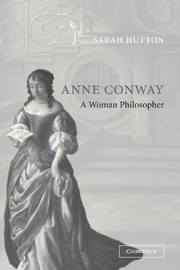Book contents
- Frontmatter
- Contents
- Acknowledgements
- Introduction
- 1 Anne Finch, Viscountess Conway
- 2 A philosophical education
- 3 Religion and Anne Conway
- 4 Anne Conway and Henry More
- 5 John Finch, Thomas Hobbes and Margaret Cavendish
- 6 Experimental physick: Boyle, Greatrakes, Stubbe
- 7 Physic and philosophy: Van Helmont, father and son
- 8 Kabbalistical dialogues
- 9 Quakerism and George Keith
- 10 Last years
- 11 Legacy
- Bibliography
- Index
5 - John Finch, Thomas Hobbes and Margaret Cavendish
Published online by Cambridge University Press: 22 September 2009
- Frontmatter
- Contents
- Acknowledgements
- Introduction
- 1 Anne Finch, Viscountess Conway
- 2 A philosophical education
- 3 Religion and Anne Conway
- 4 Anne Conway and Henry More
- 5 John Finch, Thomas Hobbes and Margaret Cavendish
- 6 Experimental physick: Boyle, Greatrakes, Stubbe
- 7 Physic and philosophy: Van Helmont, father and son
- 8 Kabbalistical dialogues
- 9 Quakerism and George Keith
- 10 Last years
- 11 Legacy
- Bibliography
- Index
Summary
‘the subtilest peeces of philosophy’
Although it is impossible to be sure at what point Anne Conway's critique of dualism was fully formed, it is certain that she was well aware of contemporary non-dualist types of philosophy, and that she first encountered it at an early point in her life. This chapter will be largely concerned with two important examples: her brother, John Finch, and the most famous English philosopher of the mid-seventeenth century, Thomas Hobbes. It will also discuss Margaret Cavendish, who was connected with Hobbes's circle but staked out her territory in opposition to Descartes, Hobbes and More. Finch, like More, was a constant point of reference throughout Anne Conway's life. Hobbes achieved notoriety in the 1650s, at about the same time that Anne Conway embarked on her own philosophical career. Although she was not personally acquainted with him, Hobbes remained a force to be reckoned with throughout her philosophical life. Margaret Cavendish appears on the scene only briefly in 1665, after Anne Conway's return from Ireland, and just prior to her encounter with Valentine Greatrakes.
JOHN FINCH
After Henry More, the person with whom Anne Conway was in continuous philosophical dialogue for almost her whole life was her brother, John Finch. Despite their being separated for most of their adult lives because of Finch's residence abroad, they were very close as brother and sister.
- Type
- Chapter
- Information
- Anne ConwayA Woman Philosopher, pp. 94 - 115Publisher: Cambridge University PressPrint publication year: 2004



